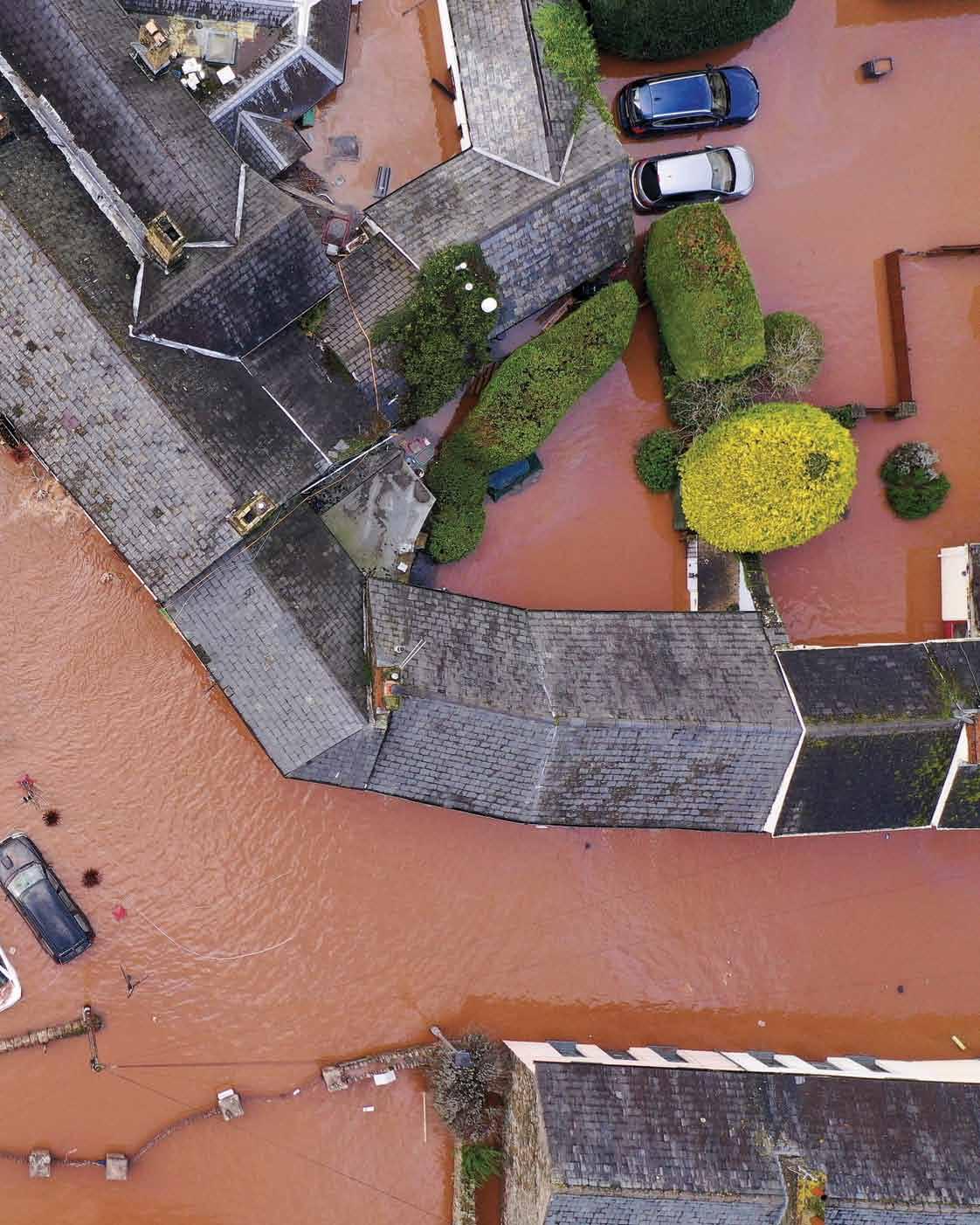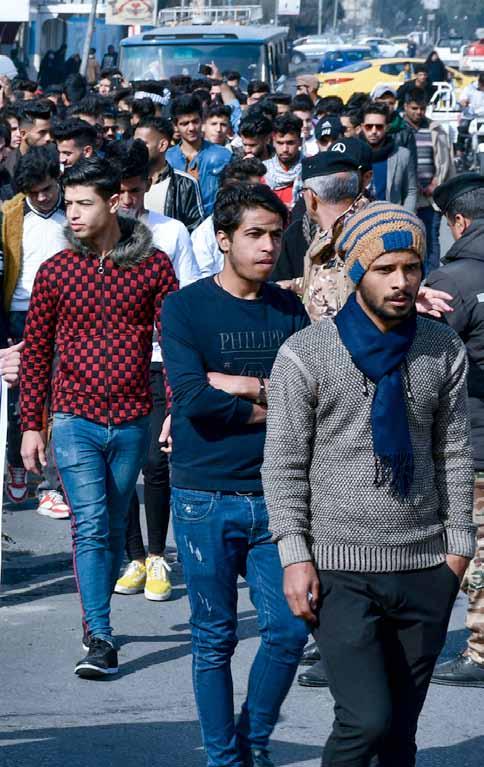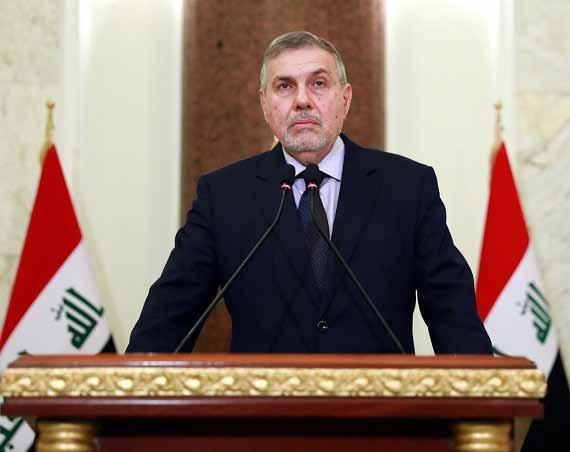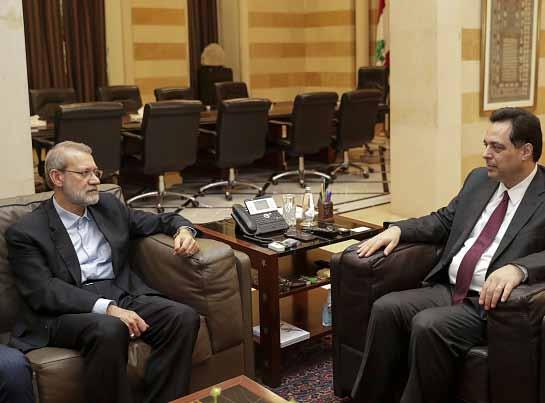
28 minute read
Issue 1788- February - 21/02/2020
napshot S
An aerial view of the Welsh village of Crickhowell which has been cut off as the river Usk burst its banks at Crickhowell bridge near the Bridge End Inn on February 2020 ,16 in Crickhowell, Wales. The Met Office have issued a red weather warning for rain in Wales and a yellow weather warning for wind for large parts of the UK as storm Dennis passes over the UK. (Getty)

Weekly news
The British Conservative Party Introduces New Points Based Immigration System, faces Backlash from Opposition Parties Britain’s government on Wednesday faced a backlash over its new post-Brexit immigration plans, which are designed to cut “cheap Labour from Europe” in favour of high-skilled English speakers. The points-based system is due to start on January 1, 2021, and was billed as “taking back control” of Britain’s borders -- a key demand of anti-EU campaigners in the divisive Brexit debate. Interior minister Priti Patel called the sweeping reforms “firm and fair” and said it would make it easier for higher-skilled workers to get visas, and harder for low-skilled migrants to do so. “We need to shift the focus of our economy away from a reliance on cheap labour from Europe and instead concentrate on investment in technology and automation,” she said. Her opposite number at the smaller Liberal Democrats said the policy was “based on xenophobia, not the social and economic needs of our country”. “Too many businesses are already struggling to hire the workers they need. Now the Tories want to stop them recruiting all but the highest-paid employees from abroad,” said Christine Jardine who is serving as the Liberal Democrat Home Affairs spokesperson.
The plans are the biggest change to immigration policy in 50 years and will go before parliament, where Prime Minister Boris Johnson has a comfortable majority. But the Conservative government was accused of failing to assess the impact of the reforms on the economy, while businesses heavily reliant on foreign labour questioned the feasibility of the policy. The main opposition Labour party said some sectors’ reliance on foreign workers would force the government to make numerous exceptions, rendering the new rules “meaningless”. Its home affairs spokesman Diana Abbott called it a “salary threshold system”, which would hit the already hard-pressed state-run National Health Service and social care sector. “If they are all short-term visas, only the most desperate workers will come, and will have the effect of creating a two-tier workforce,” Abott said.

Mike Bloomberg Surges in Polls, Qualifies for Next Democratic Debate Mike Bloomberg who made a last minute entry for the Democratic presidential nomination, but despite his late entry he has surged in the polls, and is now nationally placed in third place after Senator Bernie Sanders and former Vice President Joe Biden. Bloomberg, who owns a media empire, has been ac

cused of buying his way into the debate due to his massive spending on advertising. According to AP He has spent more than $400 million on advertising and some reports have even indicated that he has also paid social media influencers to endorse him online to their followers.

Hardliners Set to Make Massive Gains in Legislative Elections This Friday’s legislative elections in Iran will be the first one since the tensions in the Arabian Gulf. In order to secure a massive victory, as thousands of candidates, most of them moderates and reformists, have been barred from entering the race by the Council, which is dominated by ultra-conservatives. In spite of this, the Council’s spokesman Abbas Ali Kadkhodaee said the body was “neutral” in its dealings with all political camps. The Islamic Republic has been faced with protests, and many opposition groups and young voters are planning to boycott the election. Nevertheless, the Council seemed optimistic with the expected voter participation as it said that it expected at least 50 percent of registered vot-
ers to turn out at Friday’s election.

Prime Minister Allawi Picks New Cabinet Seeks Parliamentary Approval Iraq’s new transitional Prime Minister has said on Wednesday that he has picked a new government made up of political independents, and will seek a vote of confidence on the government on Monday. In a televised speech, he also called on protestors to give his new cabinet a chance and promised to pave the way to an early election free from “the influence of money, weapons, and foreign interference”. This comes as the country has been embroiled in protests since October, which has caused the deaths of 500 protestors.
Iran State News Agency Says Coronavirus Has Citizens2Killed The new virus has killed two elderly Iranian citizens, Iran’s state-run IRNA news agency reported Wednesday. IRNA quoted Alireza Vahabzadeh, an adviser to the country’s health minister, as saying that both of the victims had been carrying the coronavirus and were located in Qom, about 140 kilometers (86 miles) south of the capital Tehran. No additional details were released. Earlier on Wednesday, Iranian authorities confirmed two cases of the new virus, the first in the country, according to the semi-official ISNA news agency. Officials later said the two patients had died. ISNA quoted an official in the country’s health ministry, Kiyanoush Jahanpour, as saying that “since last two days, some suspected cases of the new coronavirus were found.” The new virus emerged in China in December. Since then, more than 75,000 people have been infected globally, with more than 2,000 deaths being reported, mostly in China. The new virus comes from a large family of what are known as coronaviruses, some causing nothing worse than a cold. It causes cold- and flu-like symptoms, including cough and fever, and in more severe cases, shortness of breath. It can worsen to pneumonia, which can be fatal. Egypt’s Health Ministry only identified its sole case as a foreigner who is carrying the virus but not showing any serious symptoms. The ministry said the person was hospitalized and in isolation. It did not specify the person’s nationality or what port of entry he or she arrived at in Egypt. The case in Egypt was also the first on the African continent. Experts and African leaders have expressed concern that should the virus spread there, it might wreak havoc among less developed countries
with fewer health resources.


First Coronavirus Case in Egypt Turns into False Alarm The World Health Organization (WHO) said on Wednesday that the person previously confirmed to have the COVID-19 coronavirus in Egypt is on his way to recovery, after latest tests showed he was “no longer carrying the virus”. “He will remain in quarantine until the full 14-day period is over and will be undergoing further required tests to ensure he was fully recovered,” WHO spokeswoman Inas Hamam said in an email. Egypt confirmed the case, its first, last week. It remains the only known instance of the new coronavirus in Africa. State TV earlier said a foreigner thought to be carrying the coronavirus had tested negative, raising questions about his initial infection.
over story C

Fearing a Loss of Influence, Tehran Quietly Tightens Grip on Regional Allies
Protestors Are No Longer Tolerating Puppets for Foreign Powers
An Iraqi antigovernment protester lifts a banner depicting the new Prime Minister-designate Mohammad Allawi with the inscription “rejected”, during a student demonstration in the southern city of Nasiriyah, on February 2020 ,6. (Getty)
by Ali El Shamy

It has been over a month since the Islamic Republic was dealt with the huge blow of losing its second most powerful figure. While Tehran has vowed to avenge Soleimani’s assassination, its threats have been receding as the reality of the risks associated with retaliatory acts became apparent. Thus far, this year has not been a good one so far for the Iranian regime, not only have they lost a vital military commander, increasing sanctions from the US has severely weakened it both domestically and regionally. As it stands, protestors are flooding the streets in Beirut, Baghdad, and Tehran which signals that the regime might be losing control both of its own people and of the governments that make up its regional allies. To mitigate such threats, the Iranian regime has recently been tightening its grip on its allies.
ALI LARIJANI VISITS NEW GOVERNMENT IN BEIRUT
After about three months of continuing protests, Lebanon finally formed a new government with Hassan Diab as the successor for outgoing Prime Minister Saad Hariri. However, this new government will likely face the same problems as the first one. Like its predecessor, this current government will not likely challenge the authority of Hezbollah, Iran’s proxy in Lebanon. This will not satisfy the protestors who after the resignation of Hariri, chanted “Everyone means everyone” a clear reference to everyone who holds authority in the country including Hassan Nasrallah and his forces. The current economic crisis has also put the new government in a precarious position, in the past whenever Lebanon faced looming economic difficulties foreign powers such as the Arab Gulf states, or the US would provide the government bailout packages which would buy the government more periods of relative stability. The most famous example of this was after the 2006 Israel–Hezbollah War when the Gulf states provided Lebanon with funds to rebuild the war-torn country. However, this time the Gulf states (with the exception of Qatar) have stated that they will not be aiding a Hezbollah backed government. The US and EU have also had their own separate sentiments towards providing loans to the new government, and recent actions on the government’s part have further soured the international community’s feelings towards it.
Two major events in Lebanon this week have indicated that Tehran is still an influential foreign power in Beirut. First and foremost, there was Ali Larijani’s, the Iranian Speaker of Parliament, meeting with the
over story C

new Prime Minister in Beirut. This was significant because Larijani is the first foreign official to visit Lebanon since it formed its new government. Furthermore, in his visit, Larijani also met with Lebanese President Michel Aoun and expressed how Tehran could help Lebanon develop its engineering capabilities to resolve its power problems. He also expressed
the importance of parliamentary cooperation between both governments and also handed Aoun a letter from Rouhani stating that he seeks an expansion of the ties that already exist between both governments. Additionally, Hezbollah did another provoking move this week as it unveiled a statue of Qassem Soleimani in Maroun Al-Ras, triggering criticism from Lebanese citizens and political leaders who are against Tehran’s influence in the country. In response to the unveiling, May Chidiac Former Minister of Administrative Reform angrily tweeted “Are we in Lebanon or Iran? Unveiling a statue of #Soleimani & naming an avenue after #Khomeini proves that Hezbollah is an arm of the Iranian Revolutionary Guards & a subsidiary of Vilayat Faqih!” These two events will not likely bode well with the US government, which has been at odds with the Islamic Republic and its regional activities.
IRAN OFFERS SUPPORT FOR NEW IRAQI GOVERNMENT
Baghdad has been facing a similar crisis to that of Beirut. Since October of last year, Iraqis have taken to streets protesting against government corruption,
12 21/02/20 Iraq’s former communications minister Mohammed Tawfiq Allawi speaks after assigned by Iraq’s president Barham Salih to form a new government, in Baghdad, Iraq on .2020 ,1February )Getty(
Lebanese Prime Minister Hassan Diab (R) meets with Iran’s Parliament Speaker Ali Larijani at the Government headquarters in the Lebanese capital Beirut, on February 2020 ,17. (Getty)

unemployment and foreign intervention of domestic affairs. One of the significant elements of this demonstration is how openly anti-Tehran the protestors are, while anti-Islamic Republic sentiment is not new in Iraq this is the first time since that Iraqis are expressing anger towards the Islamic Republic’s influence in their domestic affairs. Photos and videos of Iraqis burning Iranian flags made headlines across the globe, things came to a head in late November/early December when anti-government protestors in Najaf, southern Iraq set fire to the Iranian consulate twice in one week chanting “Iran out of Iraq”.
The protests caused Adil Abdul-Mahdi to resign from his position as Prime Minister, while former Minister of Communications Mohammed Tawfiq Allawi has been chosen as the new Prime Minister-designate. Iran has been quick to welcome Allawi’s appointment, as Iranian Foreign Ministry spokesman Abbas Mousavi was one of the first foreign officials to voice approval for Allawi’s new position. Nevertheless, Alllawi still faces a major uphill battle of winning a vote of confidence from parliament after he appoints ministers and forms a new government. Thus far, many factions within the Council of Representatives have indicated that they are not supportive of Allawi, so far only the Fatah and Sairoon alliance have voiced support for Allawi, the former bloc is well known for its pro-Tehran stances. To secure premiership, Allawi will need support from other blocs particularly Sunni and Kurdish blocs. If Allawi becomes Prime Minister, then the Islamic Republic will expect it to act on its behest, this was made evident in Mousavi’s statement which clearly indicated that the regime expects Allawi to expel US forces from Iraq.
PROTESTORS CARRY ON
Citizens from both Lebanon and Iraq have made it evident that they are no longer going to tolerate foreign intervention in their country’s policies. As long as proxies for foreign governments remain in power in Iraq and Lebanon, then protests in the street will likely continue. As it stands, things seem bleak for the people of both Iraq and Lebanon, and while new governments are forming in both states the ongoing protests will most likely render these governments impotent.
olitics P

Will Anyone Benefit from UK’s New Immigration Policy?
by Yasmine El-Geressi
The UK Government has announced its postBrexit “points-based immigration system”. The new system will keep the UK open to highly skilled workers from anywhere in the world, but will close the door on “low-skilled workers” once the freedom of movement for migrants from the -27member bloc ends in January 2021. The government says that this will allow more talented people in while reducing total numbers. To be eligible to apply to come to
Immigration and border control signs at Edinburgh Airport on February 2014 ,10 in Edinburgh, Scotland. (Getty)
the UK, over-seas potential incomers will be ranked according to criteria that requires them to secure 70 pounds, and for that they will require a job offer (20 points), be applying for a skilled job (20 points), be able to speak English (10 points) and – in most cases – be enjoying a salary of 25,600£ or above (20 points). Exceptions to the threshold will only be made for people with PhDs and those on the “shortage occupation list”. Business groups warned that major industries that have benefited hugely from EU free movement, such as the construction, hospitality and social care sectors, would face a shortage of vital workers, including small businesses that power the UK economy. Many have also criticised the new policy for measuring the contributions people make to society and the economy merely by how much they are paid. BOSSES AND UNIONS WARN OF STAFF SHORTAGES Businesses welcomed the removal of a cap on migrant numbers, the opening up of routes or skilled workers and the lowering of the 30,000£ salary threshold initially proposed. But they worry about shortages in major industries. The unemployment rate is just %3.8 and there are more than 800,000 unfilled vacancies, 100,000 of which are in the NHS. Businesses and public services worry about cutting off the flow of lower-skilled European migrants at a time of what looks something like full employment. The IPPR think tank reckons that %66 of the current EU workers in health and social care, %85 in hotels and hospitality, %90 in the transport and storage sector and %59 in construction, would be ineligible for visas under the new system, delivering a “shock” to key sectors of the economy. Unions said the care system would be “on its knees” should the policy be introducing without further reductions in the minimum salary, with Unison assistant general secretary Christina McAnea saying that plans would “spell absolute disaster for the care sector.” The chief executive and general secretary of the Royal College of Nursing, Dame Donna Kinnair, said: “We are concerned that these proposals from the Government will not meet the health and care needs of the population. The national farmers’ union president Minette Batters expressed ‘serious concerns’ about the Government’s failure to recognize British food and farming’s needs. Mark Harrison, of the Food and Drink Federa-tion (FDF), raised concerns about bakers, meat processors and workers producing food like cheese and pasta not qualifying under the new regime. Adam Marshall, director general of the British Chamber of Commerce, said the application process needed to be “radically simplified” if small and medium-size businesses were to navigate the sys-tem. The Institute of Directors said it was concerned the UK’s “economic dynamism” would be harmed while the CBI said the system would need to be flexible to keep pace with changes in the job market. Labour also criticized the plan, with Shadow Home Secretary Diane Abbott saying it will need so many exemptions that changes are “meaningless”. Liberal Democrat home affairs spokeswoman Christine Jardine said the proposals were based on “xenophobia” and not the “social and economic needs of our country”. ARE EONOMICALLY INACTIVE PEOPLE THE ANSWER TO SHORTAGES The government hopes to encourage British people back into the labour market to fill in staff shortage gaps. Priti Pa-tel, the home secretary, argues that “we have over 8.45m people in the UK aged between 16 and 64 who are ecoThe polls show that a majority want immigration cut, and everything this week’s plan shows is that it intended to be another “job done” moment for the Tories, just like Boris Johnson’s election campaign, and Brexit itself.
olitics P
nomically inactive”. She was responding as sectors from care homes to farming warned they would face difficultly recruiting. But official figures from the Office for National Statistics show that the 8.5 million 16 to 64 year olds cur-rently not seeking work include around 2.3 million students and 2.1 million long-term sick, as well as more than 1.1 million who are retired and 1.9 million who are looking after their family or home. Less than 1.9 million of the total were recorded as wanting a job.

The home secretary accepted that her own parents – who set up a chain of newsagents after arriving in the UK in the 1960s – would not have been allowed into the UK under her new rules, though she suggested that they might instead have qualified under arrangements for refugees, having faced persecution in Uganda.
Frances O’Grady, the general secretary of the TUC, said it was “not credible” for ministers to expect millions of pen-sioners, students and carers to enter the workforce. “Precarious youth and seasonal visas aren’t the answer either,” she said. “The government’s plans will make it easier for bad bosses to exploit migrant workers and
The governing approach in the new plan appears to be aimed at scoring points with voters who made it clear that the primary takeaway from Brexit was the need for strict immigration controls, rather than trying to solve legitimate labour market issues that face businesses and domestic or overseas workers.
drive down pay and conditions for everyone.” Jonathan Ashworth, the shadow health secretary, said: “Priti Patel is clearly clueless about the labour market. Not only has she unveiled an immigration policy that potentially devastates our social care sector – detrimentally impacting on some of the most vulnerable in society – she’s also justifying it by saying that those who are carers, sick or re-tired should take up these jobs.”
Luke Davis, an academic researcher at UCL, wrote that these new toughened immigration laws will add more un-skilled and poorly paid jobs to the already high number of job vacancies in the UK, and that it is unlikely to solve the more pressing problem of in-work poverty, poor
18 21/02/20 Home Secretary Priti Patel.
wage growth and precarious employment.

So if the new immigration policy make life harder for businesses, public services or workers, who is it designed to benefit? Britain’s departure from freedom of movement mean that new immigration rules are needed. But the governing approach in the new plan appears to be aimed at scoring points with voters who made it clear that the primary take-away from Brexit was the need for strict immigration controls, rather than trying to solve legitimate labour market issues that face businesses and domestic or overseas workers. The polls show
olitics P

Time to Recommit to Syria
A Currency Crisis Has Created an Opportunity to Shape the War’s End
by Jennifer Cafarella
Syria is now nine years into a civil war that frequently promises, but never manages, to wind down. President Bashar al-Assad has retaken much of the country, but broad swaths remain com-bat zones. Just this month, Assad’s forces, with Russia’s backing, advanced in Idlib Province, the opposition stronghold in northwestern Syria, after a nearly ten-monthlong offensive. Since December 2019 ,1, more than 800,000 Syrians have fled their homes. Assad may have gained territory, but his regime remains deeply fragile, and the regions under its control are unstable and growing more so. This war is not one that Assad can decisively win, even with help from Iran and Russia.
The United States must recognize that the conflict in Syria is unlikely to end in the near future. The prospect of more war is devastating, but it means that Syria’s fate is far from decided. Leveraging American diplomatic, economic, and military capabilities, which
Syrian girls pose for a photograph against a bullet-riddled wall in the rebel-held village of Kafr Ghan, in the northern countryside of Aleppo, on August ,28 2017. (Getty)
dwarf those of every other actor in Syria, could change the trajectory of the conflict, help contain the humanitarian crisis, and lay important groundwork for an eventual political transition. With so much still at stake, even lim-ited U.S. involvement could make a difference.
THE REGIME’S HIGH-WATER MARK
Assad cobbled his forces together with help from Iran and Russia. But the coalition’s military is overextended. Damascus and its partners gambled that by stretching a thin layer of control over as much terrain as possible, they could convince the international community to accept a regime “victory.” In fact, the coalition hoped that other countries would help it consolidate its power by invest-ing in reconstruction projects that could repay Iran and Russia and finance the corrupt patronage system through which Assad rules.
The plan nearly worked. By late 2018, the Syrian regime had advanced far enough that some countries began to reconsider their opposition to Assad. In perhaps its most undervalued decision in the region, the administration of U.S. President Donald Trump held the line. It refused to concede to a false regime victory and instead added sanctions on Damascus and refocused the West’s attention on a diplomatic process aimed at reaching a political settlement that would hold Assad’s regime to account and deny it reconstruction funds. Stubbornness bought important time.
The fragility of the regime’s control is increasingly apparent. In the southern province of Daraa, where Syria’s original 2011 revolution was born, a new uprising has begun. Sustained protests have sent a clear message that Assad has failed to break his opponents’ will. Insurgents have re-sumed attacking positions held by Assad, Iran, and Russia at levels approaching those of 2011. For the first time in years, the attacks have spread to the Syrian capital in Damascus and to parts of the surrounding Rif Damascus region. Meanwhile, ISIS is quickly resurging in regimeheld cen-tral Syria. The group has assaulted vital oil infrastructure and temporarily seized facilities. Such activity suggests major ISIS attacks are still to come. Assad and his backers have no serious answer to this rising instability. Instead, they continue to expand their already thinly controlled territory. Through their offensive in Idlib, regime forces have seized three important cities and gained full control of the Damascus–Aleppo highway. But the process has been grinding and costly even with the support of Russian airpower and proxy units: the Assad regime has taken high casualties and has had to repeatedly mobilize new conscripts.
Northeastern Syria has become another drain on the pro-regime coalition’s assets. The United States scaled back its forces in the area in October 2019, allowing Turkey to surge over the Syrian border. In order to gain leverage over Turkey, Russian and Syrian regime forces moved in and es-tablished a new military presence in the northeast, further stretching proregime resources.
Russia’s approach reflects its limits. Russian airpower is effective at destroying hospitals and de-populating cities, but these tactics will not defeat an insurgency. Most Russian ground forces in Syria are military police whose primary job is restoring basic law and order.
Counterinsurgents, by contrast, must protect civilians while fighting complex battles to defeat in-surgents, often in urban areas. Moreover, Russia’s military police lack credibility among Syrians, who have seen Assad undermine reconciliation deals that Russia has brokered in the past.
FINANCIAL COLLAPSE
Not only has the pro-regime military effort likely reached its peak, but the Syrian economy is collapsing. The Syrian pound fell dramatically from a 2014 rate of roughly 179 to the dollar to more than 1,000 to the dollar by late January. The sharp decline is partly the result of an economic col-lapse in neighboring Lebanon and partly a function of U.S. sanctions on Iran. The latter have forced Iran to cancel Syria’s credit line and to cut back on oil transfers to the regime.
Assad is struggling to pay warlords and finance military campaigns at a time when the insurgents are imposing ever greater costs. Food and fuel prices have risen sharply, sparking protests against the government’s
olitics P
economic policies; although still small in loyalist areas, these protests seem likely to grow. Assad is desperately attempting to head off the deepening economic crisis, in part by seiz-ing the financial assets of business leaders close to the regime. These seizures threaten to alienate loyalists and undermine local patronage structures in unstable regions.
Syria’s economic situation is going to get worse. In December, the U.S. Congress authorized sweeping sanctions against any entity providing financial, military, or technological support to As-sad’s government, his military, or Iranian and Russian entities in Syria. The restrictions are poten-tially game changing. The Trump administration supported the legislation and intends to move for-ward. By June 2020, the Treasury Department must evaluate whether Syria’s central bank is com-plicit in money laundering, in which case a cascade of sanctions will go into effect this summer. At a minimum, those sanctions would severely restrict the regime’s resources, likely forcing it to sus-pend its military offensives and deepening instability in regime-controlled areas.
The United States hopes that economic pressure will compel Assad to submit to negotiations. Yet chances of a far-reaching settlement are slim. Assad and his backers may attempt to grant Trump a superficial deal in return for sanctions relief, but such a gamble is unlikely to work. Once sanctions are implemented, Trump has the authority to unilaterally lift them if he
Leveraging American diplomatic, economic, and military capabilities, which dwarf those of every other actor in Syria, could change the trajectory of the conflict, help contain the humanitarian crisis, and lay important groundwork for an eventual political transition.
determines that the regime and its allies have ceased human rights violations and taken “verifiable steps to establish accounta-bility for war crimes.” This bar is extremely high and would be difficult to bypass. The existing diplomatic stalemate will likely continue.

THE WAR TO COME
The economic collapse of regime-held Syria would perpetuate and expand Syria’s wider, multisid-ed war. Numerous actors stand poised to take advantage of any shift in the balance of power within the country, and underlying sociocultural rifts will shape the war’s evolution: ISIS and al Qaeda extremism continue to drive long-term conflict, and Iran is sowing new social divisions by attempting to convert Syrians to Shiism and to teach them Farsi in parts of southern and east-ern Syria. Kurdish forces in the northeast are locked in a ferocious struggle with Turkey, which has invaded and effectively annexed large parts of the border region and intends to resettle one million Arab refugees there. The Kurdish forces are fighting back as an insurgency. This conflict is partly cultural: both the Kurdish forces and Turkey are trying to transform the parts of Syrian society that are under their influence in ways that will drive long-term instability even if the immediate fighting stops.
22 21/02/20 Destroyed vehicles are seen in the final ISIS encampment on March 2019 ,24 in Baghouz, Syria. (Getty)

As the pro-regime military effort wanes, Turkey’s leverage in Syria will increase. Turkey has al-ready deployed significant reinforcements to Idlib to prevent and possibly reverse pro-regime gains. And it has retaliated for multiple Syrian regime attacks on its soldiers and vowed to respond by “any means necessary” to future incidents. Russia and Turkey will attempt to de-escalate, but the more the pro-regime war effort suffers under economic pressure, the less incentive Turkey will have to grant concessions. This change in the power balance could itself drive more conflict.
ISIS and al Qaeda are also well positioned to exploit Assad’s weakness. ISIS is already surging in regimeheld Syria and expanding its campaign in Kurdishheld areas, where the U.S. drawdown has weakened security. Meanwhile, al Qaeda-linked groups have an army of approximately 20,000 fighters in Idlib, where they are making a substantial profit. Al Qaeda will remain a powerful in-surgency even if Idlib falls.
SHAPING THE ENDGAME
The United States does not need a massive military force in Syria to shape the war’s trajectory, but its
current presence is insufficient. U.S. troops continue to help Kurdish forces to dis-rupt ISIS networks, and U.S. strikes continue to disrupt al Qaeda attack cells. But current troop levels won’t be enough to defeat the ISIS insurgency or reverse al Qaeda’s rise in Syria, much less accomplish wider goals, such as stabilizing the Kurdish-dominated northeast or supporting Turkish efforts to contain the humanitarian crisis in the northwest.
The collapse of the Syrian economy and growing discontent among Assad loyalists—as well as a Turkish military intervention that has pro-regime forces badly overstretched—have created an opening. Renewed commitment to Syria will be uncomfortable, given Americans’ concerns about open-ended conflicts and coming just five months after the Trump administration’s decision to shift most U.S. troops in Syria across the border to Iraq. But the United States must act.
The U.S. troops that were redeployed to Iraq should be returned to Syria’s northeastern region. Turkey’s efforts to repel Assad’s forces and protect civilians in northwestern Syria deserve Ameri-can support. But U.S. efforts are best concentrated in the northeast. In close coordination with its allies, the United States should work to stabilize the region and to assist reconstruction, develop-ment, and resettlement efforts. Syria’s northeast has a relatively strong economy compared with economic conditions in regime-controlled areas, and focused investment will help establish it as a model of safety, prosperity, and good governance—a credible alternative to Assad that could help pave the way for a political transition. The United States has a real opportunity to change the course of the brutal Syrian war and, potentially, to shape its endgame.






